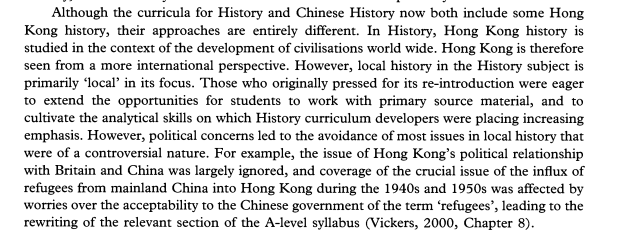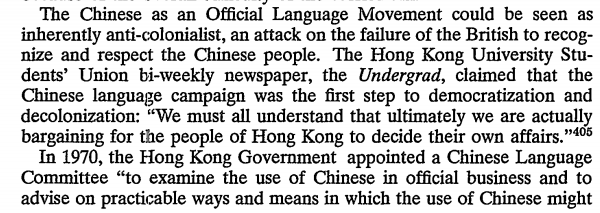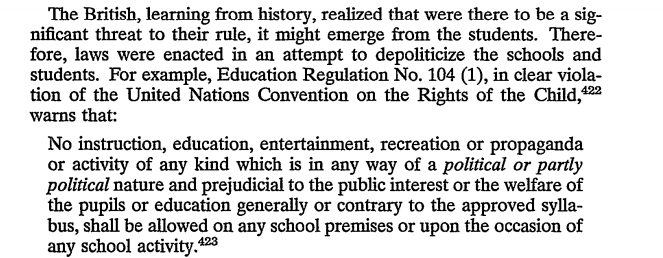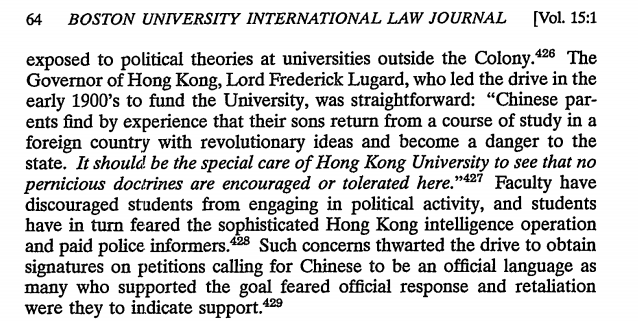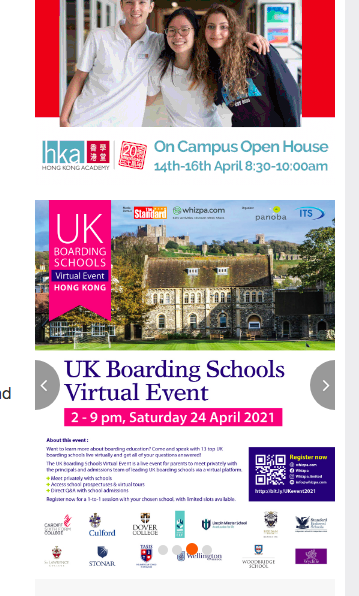There& #39;s a certain uneasiness when you see something like this, someone from a colonised country, vociferously advocating for re-colonisation, adamantly indicating a despicable level of self-hatred.
But this behaviour is common in Hong Kong. https://twitter.com/toriesandylai/status/1376939760187412485">https://twitter.com/toriesand...
But this behaviour is common in Hong Kong. https://twitter.com/toriesandylai/status/1376939760187412485">https://twitter.com/toriesand...
It& #39;s an objective reality that the British empire, in it& #39;s lust for power and zeal to install a system of white supremacy, developed a soceity in Hong Kong which delegitimised people of Chinese ethnicity, and propagated a belief that & #39;Being British& #39;, was the ideal.
In Hong Kong, the belief being taught to it& #39;s people was that being Chinese made them second class, and it was something to despise or to ignore, and that those who resided in Hong Kong should adopt a way of life, in essence completely opposite to their own traditional one.
For various periods of time, ethnic Chinese were forbidden from living in the more affluent areas of British Hong Kong, prejudiced on the belief that all Chinese were "diseased" and "criminal".
#Similar_ordinances">https://en.wikipedia.org/wiki/Peak_District_Reservation_Ordinance_1904 #Similar_ordinances">https://en.wikipedia.org/wiki/Peak...
#Similar_ordinances">https://en.wikipedia.org/wiki/Peak_District_Reservation_Ordinance_1904 #Similar_ordinances">https://en.wikipedia.org/wiki/Peak...
The only Chinese who were exempt from these regulations were the affluent Chinese who benefited from the empire, and in return provided some benefit to the empire. Many of these were keenly aware of the negative effects of these bills, but supported them regardless.
The lack of oppostion stemmed from a desire to please to colonists. Ho Kei and Wai Yuek, the two Chinese members of the council, did not oppose the bill, despite vicious opposition from the majority of the Chinese population.
http://www.legco.gov.hk/1904/h040419.pdf">https://www.legco.gov.hk/1904/h040...
http://www.legco.gov.hk/1904/h040419.pdf">https://www.legco.gov.hk/1904/h040...
One of the most evocative claims made by the supporters of British Colonial Hong Kong, was that it introduced the & #39;poor benighted natives& #39; with modern civilisation, through their application of democracy.
This is also incorrect.
This is also incorrect.
The Governor was the head of government & appointed by the British monarch to serve as the representative of the Crown in the colony. Executive power was highly concentrated with the Governor, who himself appointed almost all members of the LegCo and ExCo.
The Governor also served as President of both chambers.
It was only in 1985, 12 years before the handover, that Hong Kongers could elect councillors who would then elect members of the council. - https://en.wikipedia.org/wiki/1985_Hong_Kong_legislative_election">https://en.wikipedia.org/wiki/1985...
It was only in 1985, 12 years before the handover, that Hong Kongers could elect councillors who would then elect members of the council. - https://en.wikipedia.org/wiki/1985_Hong_Kong_legislative_election">https://en.wikipedia.org/wiki/1985...
It was only in 1991, That Hong Kongers could directly elect their council members, 6 years before the handover. https://en.wikipedia.org/wiki/1991_Hong_Kong_legislative_election">https://en.wikipedia.org/wiki/1991...
For the vast majority of British rule, & #39;democratic thought& #39; was criminalised. Newspapers critical of the British executive were shut down and their employees harassed.
Mass arrests, curfews and marital responses were frequent
https://poseidon01.ssrn.com/delivery.php?ID=524086089074010094102013011081093109027008042043001033103027005095127124031026003103013039002037111125048071097005106117096089052047088034054097006007016121088009118005084001081001094024087001090114003122010113000068085091005125113066094092027073069096&EXT=pdf&INDEX=TRUE">https://poseidon01.ssrn.com/delivery....
Mass arrests, curfews and marital responses were frequent
https://poseidon01.ssrn.com/delivery.php?ID=524086089074010094102013011081093109027008042043001033103027005095127124031026003103013039002037111125048071097005106117096089052047088034054097006007016121088009118005084001081001094024087001090114003122010113000068085091005125113066094092027073069096&EXT=pdf&INDEX=TRUE">https://poseidon01.ssrn.com/delivery....
Mass arrests and an unrepentative legal system allowed for a brutal crackdown on those who dissented against Britsh rule.
Posters, signs, texts, newspapers, and even court confessions in the Chinese language, were banned. On the basis of the necessity to establish English superiority, and on a general racialised view of the Chinese.
The system that they established, to maximise profit from plunder, was in effect to demonstrate to the Chinese & to pound into them the horrific idea that in their own land, they were slaves, and to either adapt or dissolve any bonds with their own race.
https://digitalcommons.tourolaw.edu/cgi/viewcontent.cgi?article=1253&context=scholarlyworks">https://digitalcommons.tourolaw.edu/cgi/viewc...
https://digitalcommons.tourolaw.edu/cgi/viewcontent.cgi?article=1253&context=scholarlyworks">https://digitalcommons.tourolaw.edu/cgi/viewc...
The colonists revlled in extracting profit through plunder and misery, ensuring the local populace had no option but to enslave themselves. In terms of the quality of their lives, extreme poverty,horror and despair was rampant.
Any attempt to expose this was suppressed
Any attempt to expose this was suppressed
It became pride and policy of the British government and it& #39;s colonising force, that the Chinese natives lived sorrowful lives separate from the affluent summer-vacation lives of the governing British and their merchant subsidiaries.
Prostitution, pleasures of the flesh, were major vices which they colonisers revelled in. Chinese women from the mainland in Canton were often kidnapped to become prostitutes, and given separate rooms and ID cards.
Unsatisifed with simply having captured and forced Hong Kong to capitulate, the British invaded China twice further and forced Kowloon and it& #39;s engaged subsidiary land bridges to become part of it& #39;s colony.
Despite the prohibition on slavery and involuntary servitude in Mainland Britain, the British executive allowed and enagaged itself in kidnapping Chinese girls from the mainland and forcing poverty stricken parents to sell them to wealthy colonisers and their Chinese friends
Per regulations, if a British man committed a crime, they would receive a specified sentence, however if someone of Chinese ethnicity was found to have committed the same crime, the punishment was more physical and far more severe.
Flogging became such a severe issue, that Hong Kong became it& #39;s chief global practicer. This stemmed from the ease at which the natives would be punished for the & #39;most trifling& #39; offenses.
The British parliament refused to ban it, because it was deemed & #39;suitable& #39; for Hong Kong.
The British parliament refused to ban it, because it was deemed & #39;suitable& #39; for Hong Kong.
In their zeal to remove Chinese tradition from the livelihood of Hong Kong, the British public banned specific Chinese customs and would inflict humiliating punishments on those who contined to abide by them.
1. A typical excuse for these individual affronts to human rights, even though they were not applied in Mainland Britain, was that they were present in Chinese traditional society, & were thus implemented as a sign of respect for the Chinese natives.....
2. ...However, it is clear that in their application of these laws, the British were flimsy and deeply obvious with their disgust for the natives. It was mainly the colonists who took pleasure in the mass public hangings, as opposed to the Natives for who them were directed.
The British colonisers have themselves the right to enter houses, housing estates, land sites, zones and regions, partially or wholly populated by ethnic Chinese, on the basis that they were criminals.
Following discussions planned to quell any dissent, Natives were forced to register as Chinese with the colonial registers, which required a cost many Chinese could not afford. The punishment for not registering was deportation from your own home.
Despite the already accepted cruelty of this, it wasn& #39;t enough for the colonisers, who decided that all Chinese would soon require night passes to travel in their own streets.
In specified legal terms, the British condemned the Chinese natives to be slaves and servants in their own homes. They were reduced to the status of labourers and houseboys, whereas these terms were not used for those of European and British descent.
As mentioned before, the British viewed the natives as & #39;disease ridden criminals& #39;, and when plagues struck Hong Kong, these ideas were followed through into legal policies of segregation and punishment.
Even though the ideas of C. Burtt and other racialists were being challenged worldwide, the British maintained that the Native Chinese were & #39;immoral and unintelligent& #39; by virtue of their genetics.
A nigh permanent ban on Chinese natives making a trip to, living in and residing in the vacation areas of Cheung Chau island finally drew the ire of the normally restrained elite Chinese members of the LegCo.
I won& #39;t skip over the Japanese colonisation of Hong Kong, which introduced the natives to equally if not more brutal treatment from another occupying force, as that isn& #39;t the context being examined here.
1. After more than a century of brutal racialised treatment, of slavery and servitude of oppression and cruel and unusal treatment, leftist and activist members of the working class of Hong Kong, looked towards the situation in the mainland and decided that they too needed change
2. The British re-settlement office introduced a ban on Chinese ideological flags, including and especially the Kuomintang and the Communist flags. Both groups disagreed.
It was crushed swiftly and with deadly force, but it was a sign of times to come. https://en.wikipedia.org/wiki/1956_Hong_Kong_riots">https://en.wikipedia.org/wiki/1956...
It was crushed swiftly and with deadly force, but it was a sign of times to come. https://en.wikipedia.org/wiki/1956_Hong_Kong_riots">https://en.wikipedia.org/wiki/1956...
In 1967, the people of Hong Kong rose again, after seeing the Portugese, occupiers of Macau, surrender with ease to it& #39;s own indentured natives, hope began to stir that they too could be free.
Stationing US troops on their way to Vietnam was a spark.
https://poseidon01.ssrn.com/delivery.php?ID=524086089074010094102013011081093109027008042043001033103027005095127124031026003103013039002037111125048071097005106117096089052047088034054097006007016121088009118005084001081001094024087001090114003122010113000068085091005125113066094092027073069096&EXT=pdf&INDEX=TRUE">https://poseidon01.ssrn.com/delivery....
Stationing US troops on their way to Vietnam was a spark.
https://poseidon01.ssrn.com/delivery.php?ID=524086089074010094102013011081093109027008042043001033103027005095127124031026003103013039002037111125048071097005106117096089052047088034054097006007016121088009118005084001081001094024087001090114003122010113000068085091005125113066094092027073069096&EXT=pdf&INDEX=TRUE">https://poseidon01.ssrn.com/delivery....
These protests came a year after Hong Kong was swept up in anti-British fervour, in opposition to the increase in fees for trams.
Fervour which the colonists crushed with an deadly fist, including bayonets, mass arrests and curfews. https://en.wikipedia.org/wiki/1966_Hong_Kong_riots">https://en.wikipedia.org/wiki/1966...
Fervour which the colonists crushed with an deadly fist, including bayonets, mass arrests and curfews. https://en.wikipedia.org/wiki/1966_Hong_Kong_riots">https://en.wikipedia.org/wiki/1966...
The colonist government set up an inquiry to determine the cause, finding it to be discontent from the people at their rule, and determined to set up local councils so the people could appreciate them more.
Councils later described as a & #39;farce& #39;.
https://hknews.lib.hku.hk/newspaper/view/07_08.01/90510.pdf">https://hknews.lib.hku.hk/newspaper...
Councils later described as a & #39;farce& #39;.
https://hknews.lib.hku.hk/newspaper/view/07_08.01/90510.pdf">https://hknews.lib.hku.hk/newspaper...
In May of & #39;67, at the San Po plastic flower factory, workers picketing for better conditions & pay were dismissed by the managing directors.
Riot police were called, & 21 workers were arrested. The next day, large demonstrations took place in the streets
https://industrialhistoryhk.org/hong-kong-artificial-flower-works-san-po-kong-location-of-the-start-of-the-1967-riots/">https://industrialhistoryhk.org/hong-kong...
Riot police were called, & 21 workers were arrested. The next day, large demonstrations took place in the streets
https://industrialhistoryhk.org/hong-kong-artificial-flower-works-san-po-kong-location-of-the-start-of-the-1967-riots/">https://industrialhistoryhk.org/hong-kong...
Just a few days prior to that, at the Green Island Cement Company, workers disgruntled with colonial rule and with the airy attitude of their British superiors, began to shout out quotations from Mao Tsetung.
Subsequently, the factory was shuttered.
Subsequently, the factory was shuttered.
Mass arrests and violent crackdowns followed suit. So brutal were the methods applied by the colonial forces, that even the usually submissive Chinese Chamber of Commerce, supporters of the colonial system, condemned it as "fascist" and "tyrannical".
From the legal side of things, the British colonists reacted by imposing sanctions on the Natives, through the removal of the right to a fair public trial, and imprisonment on the consent of a judge.
Speech critical of the government was banned, & subject to a ten year sentence
Speech critical of the government was banned, & subject to a ten year sentence
This was done without any consultation with legislative officials in emergency ordinances.
Anything as simple as owning a poster or coming into contact with a striker or a protestor was par for the course in terms of punishment
Anything as simple as owning a poster or coming into contact with a striker or a protestor was par for the course in terms of punishment
Under ordinances designed to punish acts of & #39;intimidation& #39;, random native Chinese members of the public were the overwhelming targets, often punished for something as small as looking at a colonist in the wrong way.
Britain responded to the protest by vastly increasing their military presence in the colony, and mass raiding suspected leftist hide outs. Targeting unions, factories, and even schools, where they would engage in mass assaults of those that resisted.
1. One controversial aspect of the protests were the use of incindiery bombs by the protestors. The bombings took the lives of several innocents, and the Colonial government engaged in a campaign to use them to turn public opinion back in their favour.
2. One incident, the death of two young children through an explosive hidden in a toys, incidents which were repeated. The British owned papers began to use these incidents to smear the protests, though prominent leftists denied responsibility.
Following the suspension of the right to trial, and the right to a jury and adequate representation, many Natives were arrested on flimsy charges and given sentences that did not meet the nature of the crimes for which they were accused.
As the death toll rose, the colonist government wished to avoid a turn in public opinion and began to dispose of corpses after a siwft period of holding them, to prevent identification. They bagn to shutter negative press and justify atrocities committed by police corps.
This action, of the mass suppression of negative reports, where even the taking of photgraphs became a criminal offense, would become central to the operation of whitewashing the colonials of crimes, & thus start the cycle of propaganda that we see among many Hong Kongers to day.
Despite being well aware of the untold cruelty they were engaging with, colonial judges, all of whom were of British origin, took glee in their sentencing, often reminding those they imprisoned, of their social status in the approved colonial racial hierarchy.
It would be difficult to elobarote individually on the casualties of the crackdown, but here& #39;s a solid enough list.
Following the massacres which accompanied the protests, many Chinese finally abandoned the city, disheartened to see their homeland treated with such indignation.
The British response was to reward the officers involved in quelling the protests.
The British response was to reward the officers involved in quelling the protests.
In direct contrast to this and despite the global media condemnation, the modern day Hong Kong police department did not engage in wanton murder or kidnapping, regardless of how desperate the attempt to claim they did was. As a USSD report revealed.
https://www.state.gov/reports/2019-country-reports-on-human-rights-practices/china/hong-kong/">https://www.state.gov/reports/2...
https://www.state.gov/reports/2019-country-reports-on-human-rights-practices/china/hong-kong/">https://www.state.gov/reports/2...
1. The question now is, despite this long & vivid history of racial humiliation & discrimination, abject civil & sexual slavery, legal apartheid, mass murder, kidnapping & torture, as well as the repeated & protracted suspension of rights..
Why is it that so many people...
Why is it that so many people...
2. ...In and from Hong Kong seem to have a deep nostalgic and whitewashed view of the colonial era, or have intentions to return Hong Kong to such a period?
The answer, in my opinion, lies with Hong Kong& #39;s educational system, and with British action to modify and control it.
The answer, in my opinion, lies with Hong Kong& #39;s educational system, and with British action to modify and control it.
In this paper, Richard Klein delves into the apartheid laws of British Hong Kong and the actions carried out by the colonials to eradicate feelings of Chinese equality with the colonials and any semblance of the native& #39;s desire to be free.
https://digitalcommons.tourolaw.edu/cgi/viewcontent.cgi?article=1253&context=scholarlyworks">https://digitalcommons.tourolaw.edu/cgi/viewc...
https://digitalcommons.tourolaw.edu/cgi/viewcontent.cgi?article=1253&context=scholarlyworks">https://digitalcommons.tourolaw.edu/cgi/viewc...
He pays particular attention to the colonials stomping of Chinese culture and tradition, & more specifically the Chinese language. Despite the reality that 98% of the population was Chinese, there was a blanket ban on the use of the Chinese language in almost all spheres of life.
A solid proportion of Hong Kong is religious, and adheres in particular to Christianity. This is due in no small part to the vicious missionaries. While religious conviction is not an issue, the missionaries were adamant in scraping away not just personal conviction but tradition
The colonists were determined to control the use of language. Controlling the means of communication is controlling the flow of information, and inevitably, the control of political beliefs.
No school would receive aid unless it was strictly run in English. Schools would not permit the use of Chinese in schools, and would discipline students who did.
Studies show the Chinese history & the Chinese language classes, those that were taught in Chinese, were restricted to avoiding a negative depiction of the Colonial government, their encroachment on Chinese sovereignty, & how Hong Kong became their proper
https://sci-hub.do/https://www.jstor.org/stable/3099672?seq=1">https://sci-hub.do/https://w...
https://sci-hub.do/https://www.jstor.org/stable/3099672?seq=1">https://sci-hub.do/https://w...
A question arises regarding the teaching of the Chinese history classes as to how they depicted the Communist revolutions, i.e modern Chinese history? Those classes were taught in English. Separating them from the nuance that could only be provided by Chinese victims.
These regulations were given the systemic rubber stamp by foreign judges, who despite internal legal contradictions, were still permitted to preside over the Bench.
One thing to note, the central court in Hong Kong has a monument topped by the Crown.
https://www.scmp.com/news/hong-kong/law-and-crime/article/3119639/no-foreign-judges-will-hear-first-national-security">https://www.scmp.com/news/hong...
One thing to note, the central court in Hong Kong has a monument topped by the Crown.
https://www.scmp.com/news/hong-kong/law-and-crime/article/3119639/no-foreign-judges-will-hear-first-national-security">https://www.scmp.com/news/hong...
Just to add on that part, the reason these foreign judges are even permitted, is because the Sino-British joint declaration allowed those who held residency cards to work in all levels of the civil service.
https://www.fmprc.gov.cn/mfa_eng/ljzg_665465/3566_665531/t17767.shtml">https://www.fmprc.gov.cn/mfa_eng/l...
https://www.fmprc.gov.cn/mfa_eng/ljzg_665465/3566_665531/t17767.shtml">https://www.fmprc.gov.cn/mfa_eng/l...
Two more lol.
https://www.bloomberg.com/news/articles/2020-07-17/u-k-judges-may-quit-hong-kong-in-wake-of-national-security-law?srnd=premium-europe
https://www.bloomberg.com/news/arti... href=" https://www.theage.com.au/world/asia/australian-judge-kicked-off-hong-kong-court-20200918-p55x0p.html">https://www.theage.com.au/world/asi...
https://www.bloomberg.com/news/articles/2020-07-17/u-k-judges-may-quit-hong-kong-in-wake-of-national-security-law?srnd=premium-europe
Returning to the issue on hand, how the control of language ensures a control over the views of Hong Kong students, particularly those being taught history. Including and especially the desire to distance Hong Kong Natives from their own history.
https://sci-hub.do/https://www.jstor.org/stable/3099672?seq=1">https://sci-hub.do/https://w...
https://sci-hub.do/https://www.jstor.org/stable/3099672?seq=1">https://sci-hub.do/https://w...
The primary objective of this was because the colonial authorities desired to curb any revolutionary or nationalistic Chinese sentiment being adopted by the students.
1. Regardless, the colonials did indeed have to educate students as to why they were in Hong kong. It& #39;s not like they popped out of nowhere. But in typical fashion, portrayals of these topics, such as the Opium war, the boxer rebellion....
2. ...& local history, were modified to be deciphered by students in a positive light. For instance, the Opium war was left out of examination questions for many years, but even when it was included, the assessments required students to write essays which downplayed British guilt
The same treatment is given to the teaching of the Boxer rebellion. Historically an uprising by Chinese nationalists to remove foreign powers and influence from the royal court, the colonials mandated the use of historical texts which portrayed the boxers as being & #39;anti-foreign& #39;.
Regarding Local history, the Colonial government knew it was controversial, seeing as they would then have to teach the students the cruel reality of their occupation. Subsequently, the original course which discussed how Hong Kong had & #39;developed& #39; under the British was dropped.
Even when local Hong Kong history was instituted, politically inconvenient topics were removed from the discourse.
When discussions were being held to see if the government should allow the Chinese language to be taught and used in official settings, students complained that the committes they were using to study how to go about this were unecessarily complicated and actually stood in the way
When they protested, the colonials went back into mass arrest mode, using laws even Mainland Britain didn& #39;t use.
The justification of which was that posters stating & #39;Down With Colonialism& #39; might disturb the peace, along with the writing of posters in Chinese characters.
The justification of which was that posters stating & #39;Down With Colonialism& #39; might disturb the peace, along with the writing of posters in Chinese characters.
Having understood the reality that students were the primary drive of many of history& #39;s revolutions, the British advanced to depoloiticise the universities, banning & #39;propaganda& #39; of any sort.
One of the sources of modern separatist and independent thought in Hong Kong is the University of Hong Kong. This isn& #39;t much of a surprise, seeing as the British ensured that it would remain an institution devoted to defending the integrity of the colonial system.
1. As noted, the goal of all this was to suppress independent thought, Chinese nationalism, to reduce ties between the people and their land, and to ensure that the only common link for all was the colonials.
And it& #39;s a practice continued in Hong Kong& #39;s education system today.
And it& #39;s a practice continued in Hong Kong& #39;s education system today.
2. This particularised education, coupled with the slow reduction of importance of Hong Kong on the global market as well as to the Chinese mainland, in terms of the idea that the Brits ran a successful colony, whilst the Chinese could not even run a successful country...
3. Enshrined within Hong Kong a feeling that it was & #39;special& #39;, that it was worth more than those in the Mainland, not through their own work or their efforts, but through the benevolence of their colonial masters.
This lead consequently to a feverish desire to please or...
This lead consequently to a feverish desire to please or...
4. ...to copy them in terms of their trends or their culture. An entire generation of children became inflicted with what& #39;s referred to as "HK Kid syndrome", being lazy, petulant and spoilt.
A good exmaple being when some of them were stranded at an airport...
A good exmaple being when some of them were stranded at an airport...
5. ...They slept in the banquet halls and the lounges and complained that they felt as if they were in a concentration camp.
http://english.mingpao.com/cfm/database3.cfm?File=20110111/critica/critica1.txt">https://english.mingpao.com/cfm/datab...
http://english.mingpao.com/cfm/database3.cfm?File=20110111/critica/critica1.txt">https://english.mingpao.com/cfm/datab...
6. ..All as a direct result of the education they recieve, which dictates that nothgin should come first but the security, or the pleasure of the colonial master, even if it comes at the deprecation of one& #39;s self as a person, or one& #39;s ethnicity. Let& #39;s take a look at some examples
For example, what is it that causes Hong Kongers, however small a percentage, to sign a petition demanding that Trump, a racist, & #39;liberate Hong Kong from the Chinese& #39;?
Or cause others to raise signs saying & #39;when America invades, I& #39;ll point the way& #39;.
https://petitions.whitehouse.gov/petition/president-trump-please-liberate-hong-kong-communist-chinas-occupation">https://petitions.whitehouse.gov/petition/...
Or cause others to raise signs saying & #39;when America invades, I& #39;ll point the way& #39;.
https://petitions.whitehouse.gov/petition/president-trump-please-liberate-hong-kong-communist-chinas-occupation">https://petitions.whitehouse.gov/petition/...
What causes contributors to the GlobeAndMail to write articles proclaiming the & #39;wisdom and endeavour& #39; of the Colonists?
https://www.theglobeandmail.com/amp/opinion/article-in-hong-kong-colonialism-isnt-a-bad-word-its-a-legacy-worth/">https://www.theglobeandmail.com/amp/opini...
https://www.theglobeandmail.com/amp/opinion/article-in-hong-kong-colonialism-isnt-a-bad-word-its-a-legacy-worth/">https://www.theglobeandmail.com/amp/opini...
It should go without saying that, as the colonials ran the regulatory bodies, institutions of the media also played their part. TVB being prominent among them.
https://henryckliu.com/page50.html ">https://henryckliu.com/page50.ht...
https://henryckliu.com/page50.html ">https://henryckliu.com/page50.ht...

 Read on Twitter
Read on Twitter


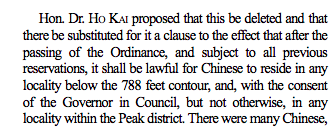


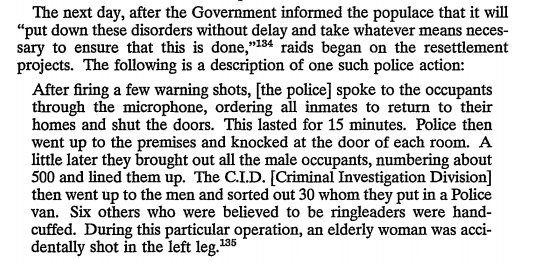
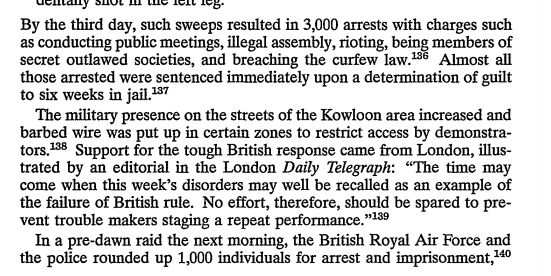
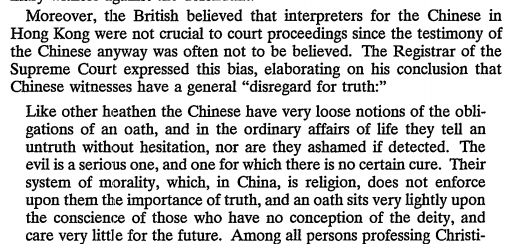

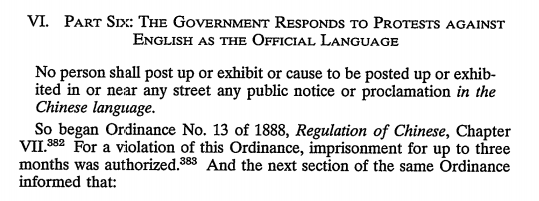


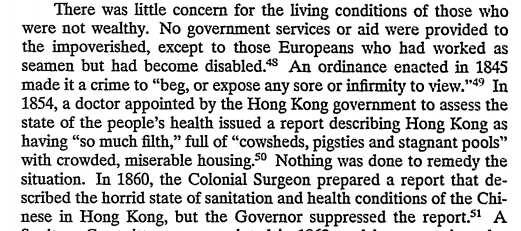
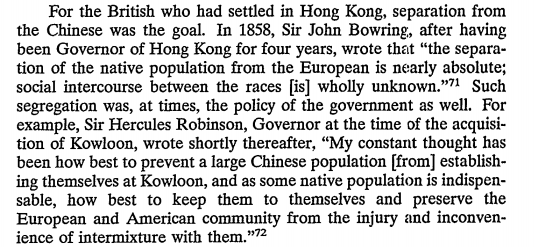

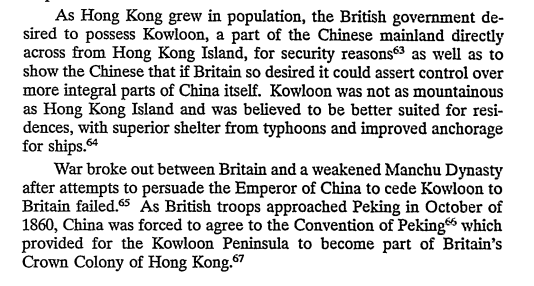
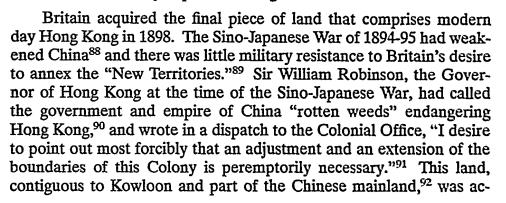
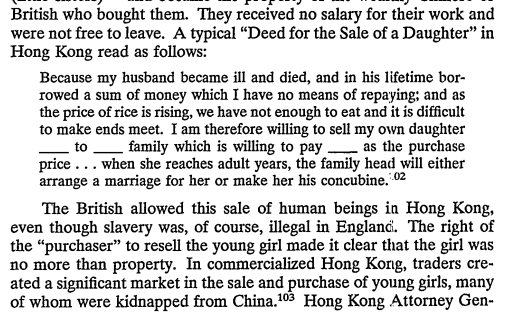
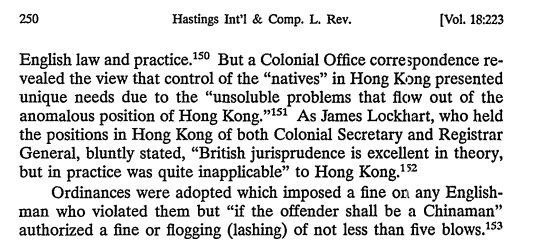
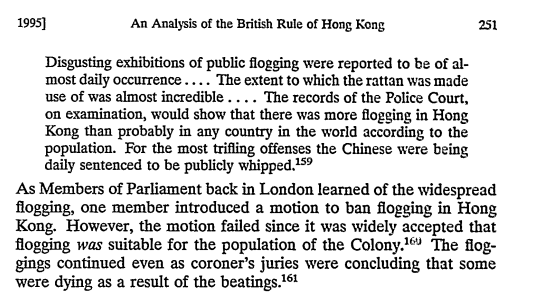



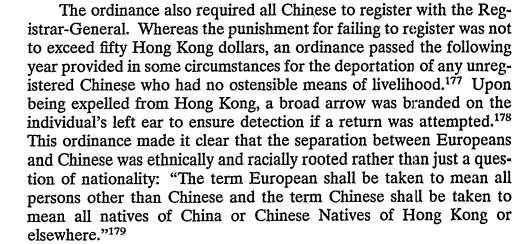

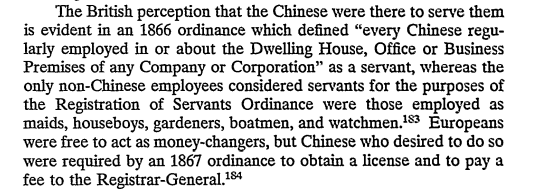
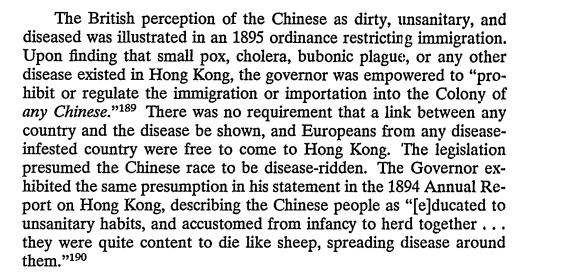
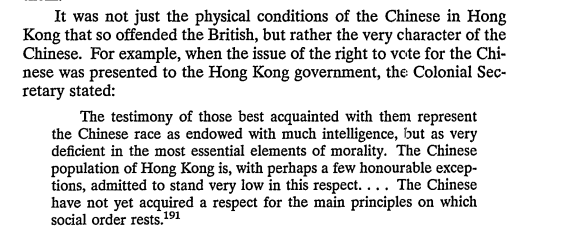






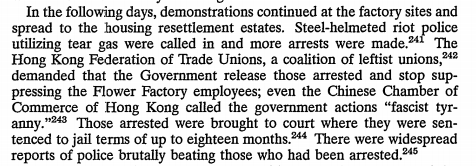





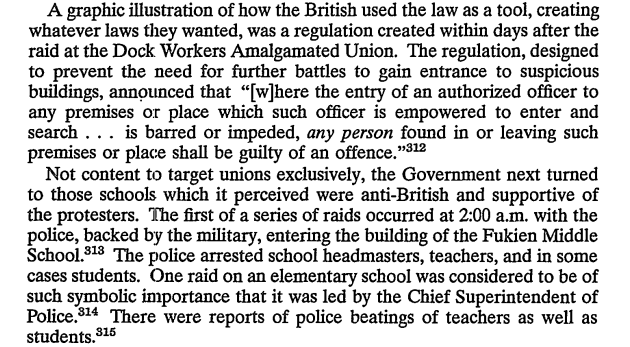


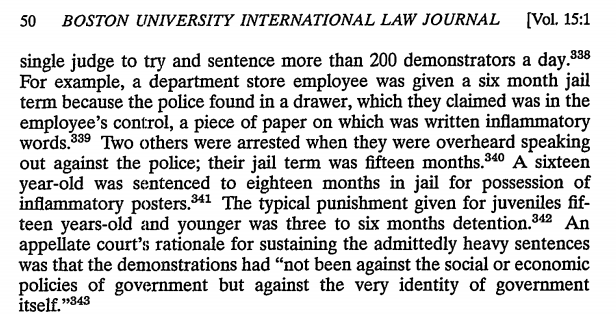
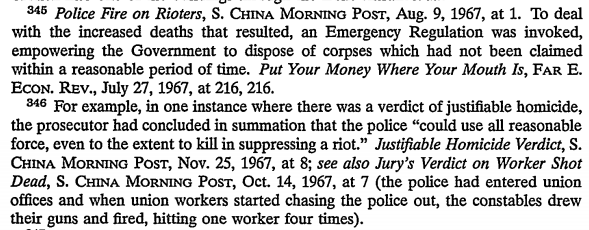

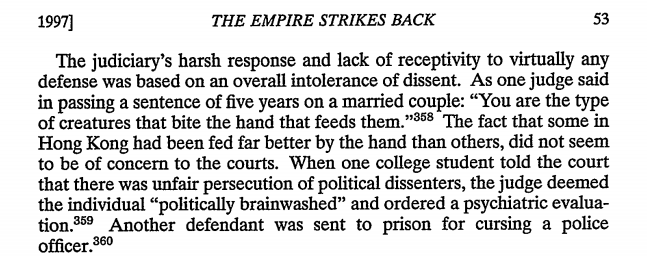
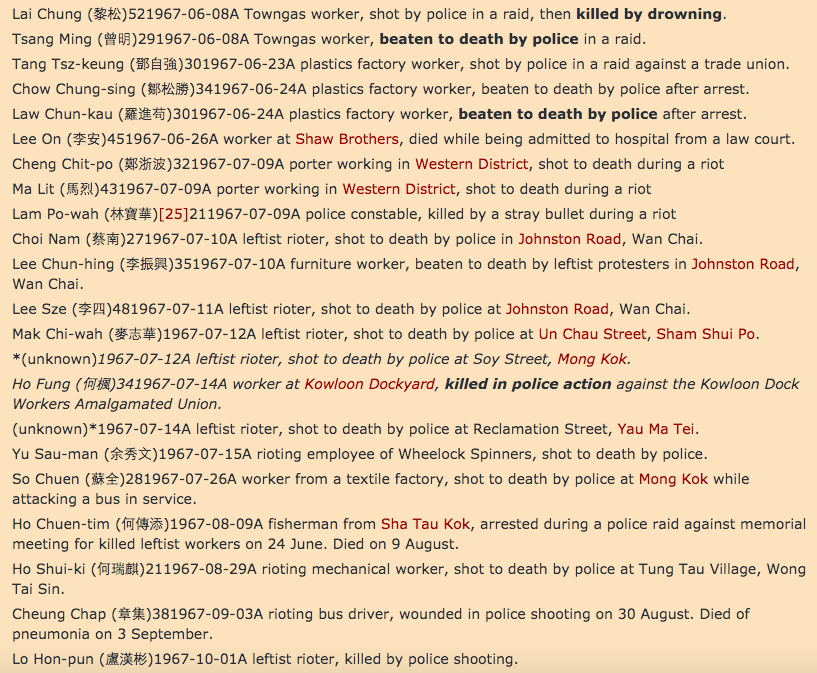





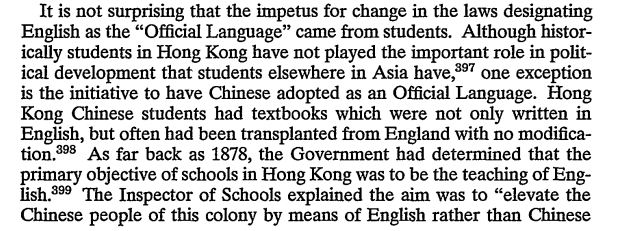


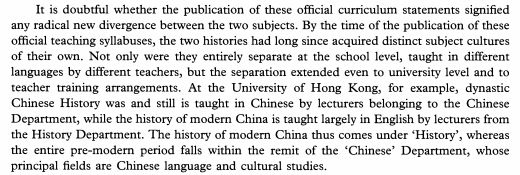

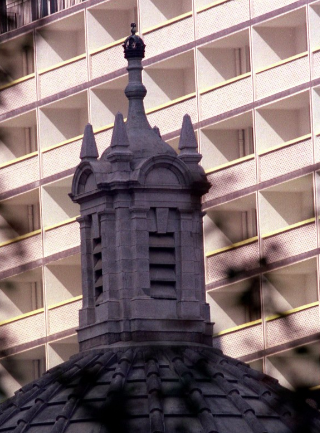
 https://www.theage.com.au/world/asi..." title="Two more lol. https://www.bloomberg.com/news/arti... href=" https://www.theage.com.au/world/asia/australian-judge-kicked-off-hong-kong-court-20200918-p55x0p.html">https://www.theage.com.au/world/asi...">
https://www.theage.com.au/world/asi..." title="Two more lol. https://www.bloomberg.com/news/arti... href=" https://www.theage.com.au/world/asia/australian-judge-kicked-off-hong-kong-court-20200918-p55x0p.html">https://www.theage.com.au/world/asi...">
 https://www.theage.com.au/world/asi..." title="Two more lol. https://www.bloomberg.com/news/arti... href=" https://www.theage.com.au/world/asia/australian-judge-kicked-off-hong-kong-court-20200918-p55x0p.html">https://www.theage.com.au/world/asi...">
https://www.theage.com.au/world/asi..." title="Two more lol. https://www.bloomberg.com/news/arti... href=" https://www.theage.com.au/world/asia/australian-judge-kicked-off-hong-kong-court-20200918-p55x0p.html">https://www.theage.com.au/world/asi...">









